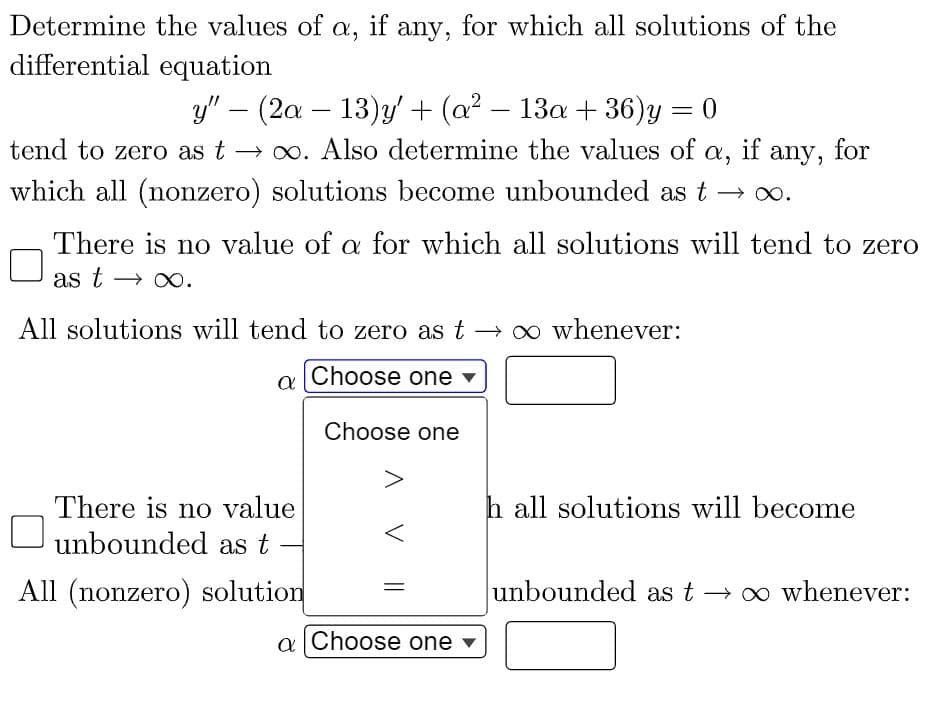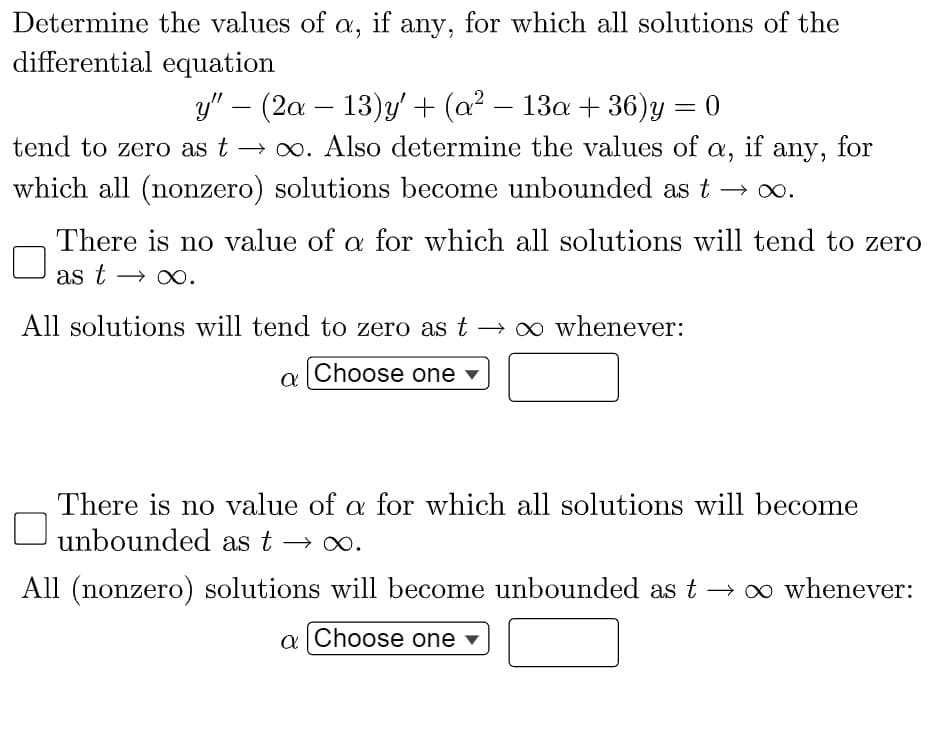Determine the values of a, if any, for which all solutions of the differential equation y" (2a - 13)y' + (a² - 13a + 36)y = 0 tend to zero as t→∞. Also determine the values of a, if any, for which all (nonzero) solutions become unbounded as t → ∞. -
Determine the values of a, if any, for which all solutions of the differential equation y" (2a - 13)y' + (a² - 13a + 36)y = 0 tend to zero as t→∞. Also determine the values of a, if any, for which all (nonzero) solutions become unbounded as t → ∞. -
Advanced Engineering Mathematics
10th Edition
ISBN:9780470458365
Author:Erwin Kreyszig
Publisher:Erwin Kreyszig
Chapter2: Second-order Linear Odes
Section: Chapter Questions
Problem 1RQ
Related questions
Question
show complete solution and explain

Transcribed Image Text:Determine the values of a, if any, for which all solutions of the
differential equation
y" − (2a − 13)y' + (a² − 13a + 36)y = 0
-
if
tend to zero as t →∞. Also determine the values of α,
which all (nonzero) solutions become unbounded as t
There is no value of a for which all solutions will tend to zero
as t → ∞.
All solutions will tend to zero as to whenever:
Choose one
a
There is no value
unbounded as t
All (nonzero) solution
Choose one
V
a Choose one ▾
any, for
∞.
h all solutions will become
unbounded as t → ∞ whenever:

Transcribed Image Text:Determine the values of a, if any, for which all solutions of the
differential equation
y" (2a - 13)y' + (a² — 13a +36) y
-
= 0
tend to zero as t→∞o. Also determine the values of a,
which all (nonzero) solutions become unbounded as t
All solutions will tend to zero as t→∞ whenever:
Choose one ▼
if any,
There is no value of a for which all solutions will tend to zero
as t→ ∞.
a
any, for
There is no value of a for which all solutions will become
unbounded as t ∞.
All (nonzero) solutions will become unbounded as t → ∞ whenever:
a Choose one ▾
Expert Solution
This question has been solved!
Explore an expertly crafted, step-by-step solution for a thorough understanding of key concepts.
This is a popular solution!
Trending now
This is a popular solution!
Step by step
Solved in 5 steps

Recommended textbooks for you

Advanced Engineering Mathematics
Advanced Math
ISBN:
9780470458365
Author:
Erwin Kreyszig
Publisher:
Wiley, John & Sons, Incorporated

Numerical Methods for Engineers
Advanced Math
ISBN:
9780073397924
Author:
Steven C. Chapra Dr., Raymond P. Canale
Publisher:
McGraw-Hill Education

Introductory Mathematics for Engineering Applicat…
Advanced Math
ISBN:
9781118141809
Author:
Nathan Klingbeil
Publisher:
WILEY

Advanced Engineering Mathematics
Advanced Math
ISBN:
9780470458365
Author:
Erwin Kreyszig
Publisher:
Wiley, John & Sons, Incorporated

Numerical Methods for Engineers
Advanced Math
ISBN:
9780073397924
Author:
Steven C. Chapra Dr., Raymond P. Canale
Publisher:
McGraw-Hill Education

Introductory Mathematics for Engineering Applicat…
Advanced Math
ISBN:
9781118141809
Author:
Nathan Klingbeil
Publisher:
WILEY

Mathematics For Machine Technology
Advanced Math
ISBN:
9781337798310
Author:
Peterson, John.
Publisher:
Cengage Learning,

